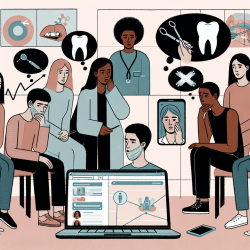Introduction
Dental anxiety is a prevalent issue that affects individuals worldwide, including those training to become dental professionals. The study titled Dental anxiety in first- and final-year Indian dental students provides valuable insights into the levels of dental anxiety among dental students in India. This research offers a foundation for practitioners to improve their skills in managing dental anxiety and encourages further exploration into effective strategies for anxiety reduction.
Research Overview
The study conducted a comprehensive assessment of dental anxiety among 614 Bachelor of Dental Surgery (BDS) students from four dental colleges in India. Using the Modified Dental Anxiety Scale (MDAS), the researchers found that first-year students exhibited higher levels of anxiety compared to their final-year counterparts. The mean MDAS scores were 12.96±4.00 for first-year students and 10.54±3.41 for final-year students, a statistically significant difference (p<0.0001).
Key Findings
- First-year students showed moderate dental anxiety, while final-year students had lower anxiety levels.
- The anxiety scores were below the threshold for dental phobia, indicating a moderate level of concern.
- Factors contributing to dental anxiety included previous unpleasant dental experiences and specific stimuli like dental drills and local anesthetic injections.
Implications for Practitioners
Understanding the anxiety levels among dental students is crucial for developing strategies to manage patient anxiety effectively. Practitioners can implement the following approaches:
- Enhanced Communication: Effective communication can help in reducing anxiety by setting clear expectations and providing reassurance to patients.
- Empathy and Sensitivity: Being empathetic and sensitive to patients' concerns can significantly alleviate anxiety levels.
- Exposure Therapy: Gradual exposure to dental procedures in a controlled environment can help students and patients become more comfortable with dental treatments.
- Behavioral Interventions: Techniques such as relaxation exercises and cognitive-behavioral therapy can be beneficial in managing dental anxiety.
Encouraging Further Research
The findings of this study highlight the need for further research into dental anxiety and its management. Practitioners and researchers are encouraged to explore innovative approaches to reduce anxiety and improve patient outcomes. Understanding the multifactorial nature of dental anxiety can lead to more personalized and effective interventions.
Conclusion
This study provides a valuable understanding of dental anxiety among dental students, emphasizing the importance of addressing this issue early in dental education. By implementing effective strategies, practitioners can not only improve their skills but also enhance the quality of care provided to patients.
To read the original research paper, please follow this link: Dental anxiety in first- and final-year Indian dental students.










